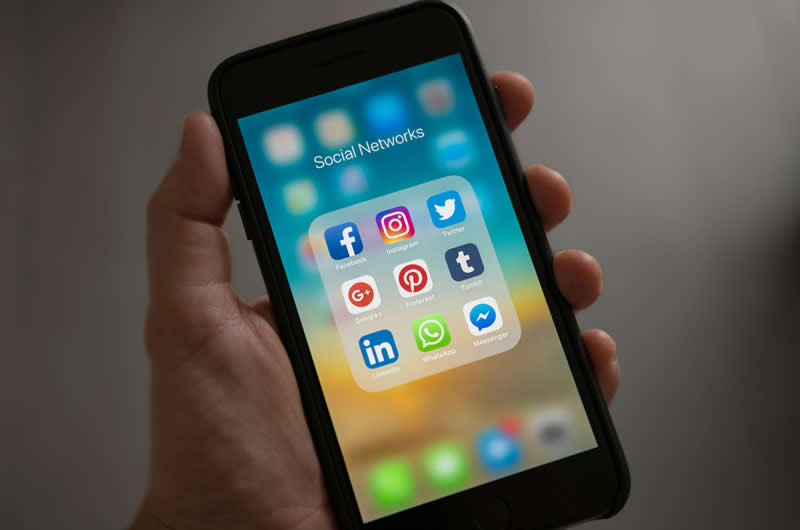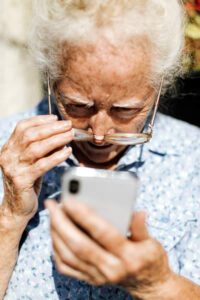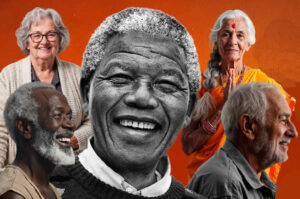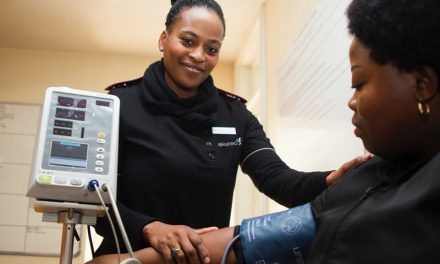Communication through the ages – we’ve come a long way!
During our recent function to honour our faithful volunteers, we celebrated Tafta’s 67 years as an organisation with a fun ‘back in time’ theme … all the way back to the 1950s when Tafta was first established. It got us thinking about how we kept in touch with both volunteers and clients back then. Communication channels were a world away from today’s quick WhatsApp message!
Can you believe there were no mobile phones? You had to call on landlines … on heavy, black telephones with a rotary dial. And you had to know the number you were dialling (no contacts list to save it for you). If someone wasn’t at home or at the office, you simply couldn’t get hold of them. Imagine that! A world where no one knew exactly where you were and couldn’t reach you instantly … even in the bathroom!

Sharing a phone line
Some people in smaller towns and rural areas even had to share a ‘party’ telephone line. You had to listen for your particular ring pattern, e.g. two short, one long ring, and only answer ‘your’ calls. But of course, human nature being what it is, not everyone obeyed the rules, and you could never be sure that someone else wasn’t eavesdropping on your conversation.
Plans had to be made well in advance. If you were delayed or had to cancel, there was no way to let the other person know. In some cases, this had its advantages – like blind dates where you could quietly check out your date from a distance and slip away unnoticed if you weren’t impressed!

Communication through the post
Bills and important notices arrived by post, along with letters from loved ones far away. Checking the post box was the highlight of the day. Many older people will remember the joy of receiving a personal, hand written letter – and the anticipation of sitting down with a cup of tea to read it slowly. Best of all, those letters could be kept for years and reread whenever you wanted to feel close to the sender. It’s a far cry from today, when you don’t even have to find your own words – Chat GPT will do that for you. All you need to do is copy and paste.
Urgent messages arrived by telegram. While these often brought bad news, there was also the tradition of sending celebratory telegrams to bridal couples if you couldn’t attend the wedding – something that lives on today, only now as emails or SMS messages.
Back in the 60s, many businesses communicated via telex. This entailed typing a message into a teleprinter, which converted the words into perforated dots on a paper tape. The tape was then fed into the transmitter to be printed out by a teleprinter at another destination. Making a typing error usually resulted in having to start again from scratch. No wonder many an office typist breathed a sigh of relief when telex was replaced by fax in the 80s.

Fast forward to today – communication has transformed beyond recognition
Mobile phones are everywhere, making us instantly reachable no matter where we are. Messaging apps like WhatsApp and SMS allow us to communicate instantly – through text messages, voice notes, photos, even videos. If you’re running late to a meeting or lunch, you can let everyone know in seconds, avoiding misunderstandings that were once inevitable.
Best of all, there’s no more ‘booking’ an international call – and paying through the nose to speak to loved ones overseas or in a different town. Calls over the internet are free … to anywhere. And nowadays you can even see the person you’re talking to! Video calls allow grandparents to connect with their grandchildren, even if they live on opposite sides of the world, and literally watch them grow up.

WhatsApp groups – like neighbourhood watches – allow us get to know neighbours we never see, and help keep us safe by alerting us to suspicious activity on our streets.
Email, once a revolution on its own, remains essential for business and formal communication. Digital newsletters keep us updated on our favourite causes, enabling organisations like Tafta to maintain contact with thousands of supporters at a fraction of the cost of postal mail.
 Social media allows us into the lives of family and friends, sharing everything from holidays and celebrations to inspirational quotes and news. Facebook is also amazing for ‘finding’ and re-connecting with old school friends you might have lost touch with.
Social media allows us into the lives of family and friends, sharing everything from holidays and celebrations to inspirational quotes and news. Facebook is also amazing for ‘finding’ and re-connecting with old school friends you might have lost touch with.
Using social media for good
But all these modern tools are not just about convenience. They’re opportunities to make a difference. Social media doesn’t have to be just a way to stay in touch – it’s also a powerful platform for good, alerting us to causes doing amazing work and enabling us to get involved.

And what better time to get involved than now, in honour of our beloved Nelson Mandela’s day on 18 July? Check out Tafta’s Facebook or Instagram pages for details of the 67 items on our wish list, in honour of both Madiba’s 67 years of service and Tafta’s 67 years of existence.
Please consider donating one or two items. You don’t even have to leave home – use a delivery service like Checkers 60/60 to send items straight to us. Or even easier, donate cash online, and we’ll buy the most urgently needed items on your behalf.
Let’s use the power of modern communication to spread kindness and make a real difference this Mandela Day.






